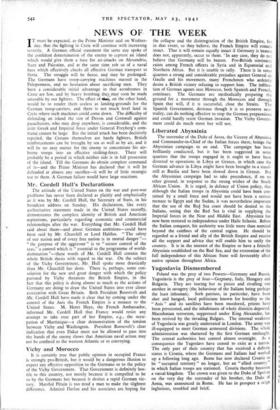NEWS OF THE WEEK I T must be expected, as the
Prime Minister said on Wednes- day, that the fighting in Crete will continue with increasing severity. A German official statement the same nay spoke of the confident determination of the enemy to capture an island which would give them a base for air-attacks on Alexandria, Suez and Palestine, and at the same time rob us of a naval base which effectively checks all effective German transport to Syria. The struggle will be fierce, and may be prolonged. The Germans have troop-carrying machines massed in the Peloponnese, and no hesitation about sacrificing men. They have a considerable initial advantage in that aerodromes in Crete are few, and by heavy bombing they. may soon be made unusable by our fighters. The effect of gitiat, on the other hand, would be to render them useless as landing-grounds for the German troop-carriers, and there is not much level land in Crete where such machines could come down. The difficulty of defending an island the size of Devon and Cornwall against parachutists, who may drop anywhere, is considerable, and the joint Greek and Imperial force under General Freyberg's com- mand cannot be large. But the initial attack has been decisively repelled, the Cretans themselves are hardy fighters, British reinforcements can be brought by sea as well as by air, and it will be no easy matter for the enemy to concentrate his air- borne troops into an effective striking-force. There will probably be a period in which neither side is in full possession of the island. Till the Germans do obtain complete command of it—and the Prime Minister has declared that it will be defended at almost any sacrifice—it will be of little strategic use to them. A German failure would have large reactions.






























 Previous page
Previous page